Psychology 101 Essay: The Impact of Stress on Human Life
VerifiedAdded on 2022/12/22
|7
|2238
|1
Essay
AI Summary
This psychology essay examines the multifaceted nature of stress, acknowledging its unavoidable presence in human life and its potential for both positive and negative impacts. It explores different types of stress, including positive stress that motivates and negative stress that harms physical and mental health. The essay delves into the psychological theories of stress, such as the James-Lange theory of emotion and Selye's General Adaptation Syndrome, and emphasizes the importance of effective stress management. It discusses various coping mechanisms, including problem-solving approaches, psychological techniques, and biological methods like biofeedback and neurofeedback. Additionally, the essay highlights the benefits of physical activities like exercise and yoga in managing stress. The conclusion reiterates the importance of understanding and managing stress to maintain a healthy and fulfilling life.
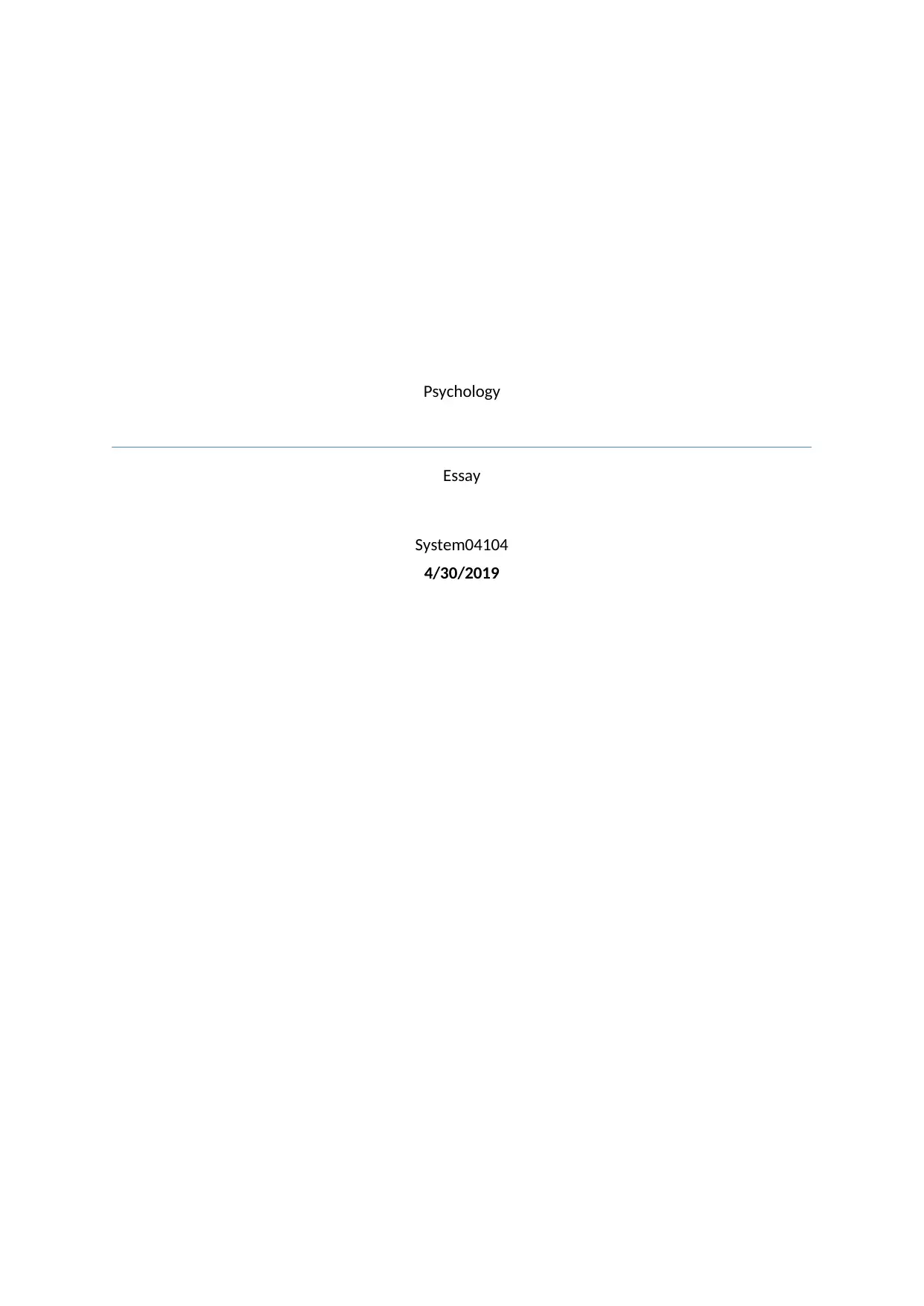
Psychology
Essay
System04104
4/30/2019
Essay
System04104
4/30/2019
Paraphrase This Document
Need a fresh take? Get an instant paraphrase of this document with our AI Paraphraser
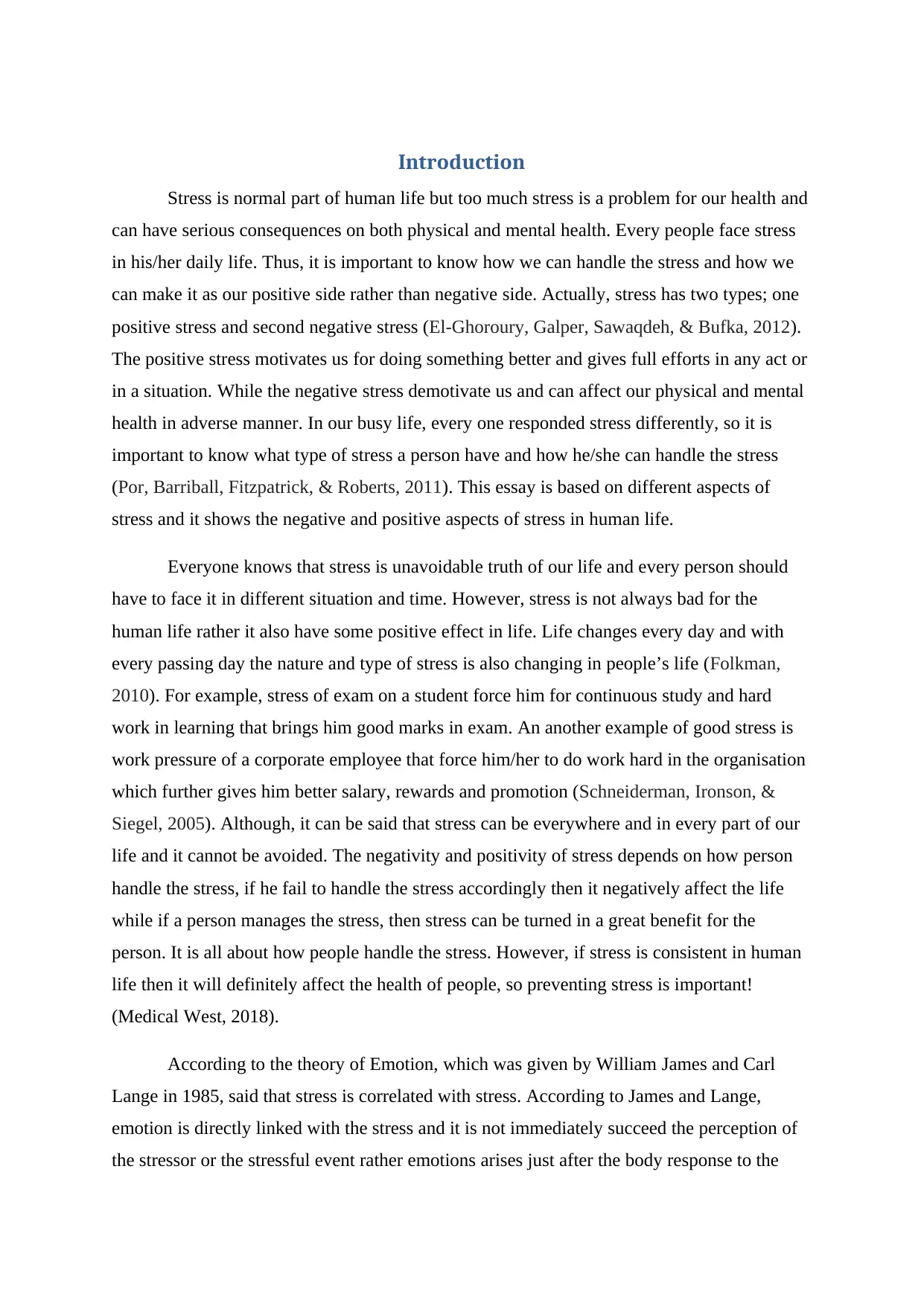
Introduction
Stress is normal part of human life but too much stress is a problem for our health and
can have serious consequences on both physical and mental health. Every people face stress
in his/her daily life. Thus, it is important to know how we can handle the stress and how we
can make it as our positive side rather than negative side. Actually, stress has two types; one
positive stress and second negative stress (El-Ghoroury, Galper, Sawaqdeh, & Bufka, 2012).
The positive stress motivates us for doing something better and gives full efforts in any act or
in a situation. While the negative stress demotivate us and can affect our physical and mental
health in adverse manner. In our busy life, every one responded stress differently, so it is
important to know what type of stress a person have and how he/she can handle the stress
(Por, Barriball, Fitzpatrick, & Roberts, 2011). This essay is based on different aspects of
stress and it shows the negative and positive aspects of stress in human life.
Everyone knows that stress is unavoidable truth of our life and every person should
have to face it in different situation and time. However, stress is not always bad for the
human life rather it also have some positive effect in life. Life changes every day and with
every passing day the nature and type of stress is also changing in people’s life (Folkman,
2010). For example, stress of exam on a student force him for continuous study and hard
work in learning that brings him good marks in exam. An another example of good stress is
work pressure of a corporate employee that force him/her to do work hard in the organisation
which further gives him better salary, rewards and promotion (Schneiderman, Ironson, &
Siegel, 2005). Although, it can be said that stress can be everywhere and in every part of our
life and it cannot be avoided. The negativity and positivity of stress depends on how person
handle the stress, if he fail to handle the stress accordingly then it negatively affect the life
while if a person manages the stress, then stress can be turned in a great benefit for the
person. It is all about how people handle the stress. However, if stress is consistent in human
life then it will definitely affect the health of people, so preventing stress is important!
(Medical West, 2018).
According to the theory of Emotion, which was given by William James and Carl
Lange in 1985, said that stress is correlated with stress. According to James and Lange,
emotion is directly linked with the stress and it is not immediately succeed the perception of
the stressor or the stressful event rather emotions arises just after the body response to the
Stress is normal part of human life but too much stress is a problem for our health and
can have serious consequences on both physical and mental health. Every people face stress
in his/her daily life. Thus, it is important to know how we can handle the stress and how we
can make it as our positive side rather than negative side. Actually, stress has two types; one
positive stress and second negative stress (El-Ghoroury, Galper, Sawaqdeh, & Bufka, 2012).
The positive stress motivates us for doing something better and gives full efforts in any act or
in a situation. While the negative stress demotivate us and can affect our physical and mental
health in adverse manner. In our busy life, every one responded stress differently, so it is
important to know what type of stress a person have and how he/she can handle the stress
(Por, Barriball, Fitzpatrick, & Roberts, 2011). This essay is based on different aspects of
stress and it shows the negative and positive aspects of stress in human life.
Everyone knows that stress is unavoidable truth of our life and every person should
have to face it in different situation and time. However, stress is not always bad for the
human life rather it also have some positive effect in life. Life changes every day and with
every passing day the nature and type of stress is also changing in people’s life (Folkman,
2010). For example, stress of exam on a student force him for continuous study and hard
work in learning that brings him good marks in exam. An another example of good stress is
work pressure of a corporate employee that force him/her to do work hard in the organisation
which further gives him better salary, rewards and promotion (Schneiderman, Ironson, &
Siegel, 2005). Although, it can be said that stress can be everywhere and in every part of our
life and it cannot be avoided. The negativity and positivity of stress depends on how person
handle the stress, if he fail to handle the stress accordingly then it negatively affect the life
while if a person manages the stress, then stress can be turned in a great benefit for the
person. It is all about how people handle the stress. However, if stress is consistent in human
life then it will definitely affect the health of people, so preventing stress is important!
(Medical West, 2018).
According to the theory of Emotion, which was given by William James and Carl
Lange in 1985, said that stress is correlated with stress. According to James and Lange,
emotion is directly linked with the stress and it is not immediately succeed the perception of
the stressor or the stressful event rather emotions arises just after the body response to the
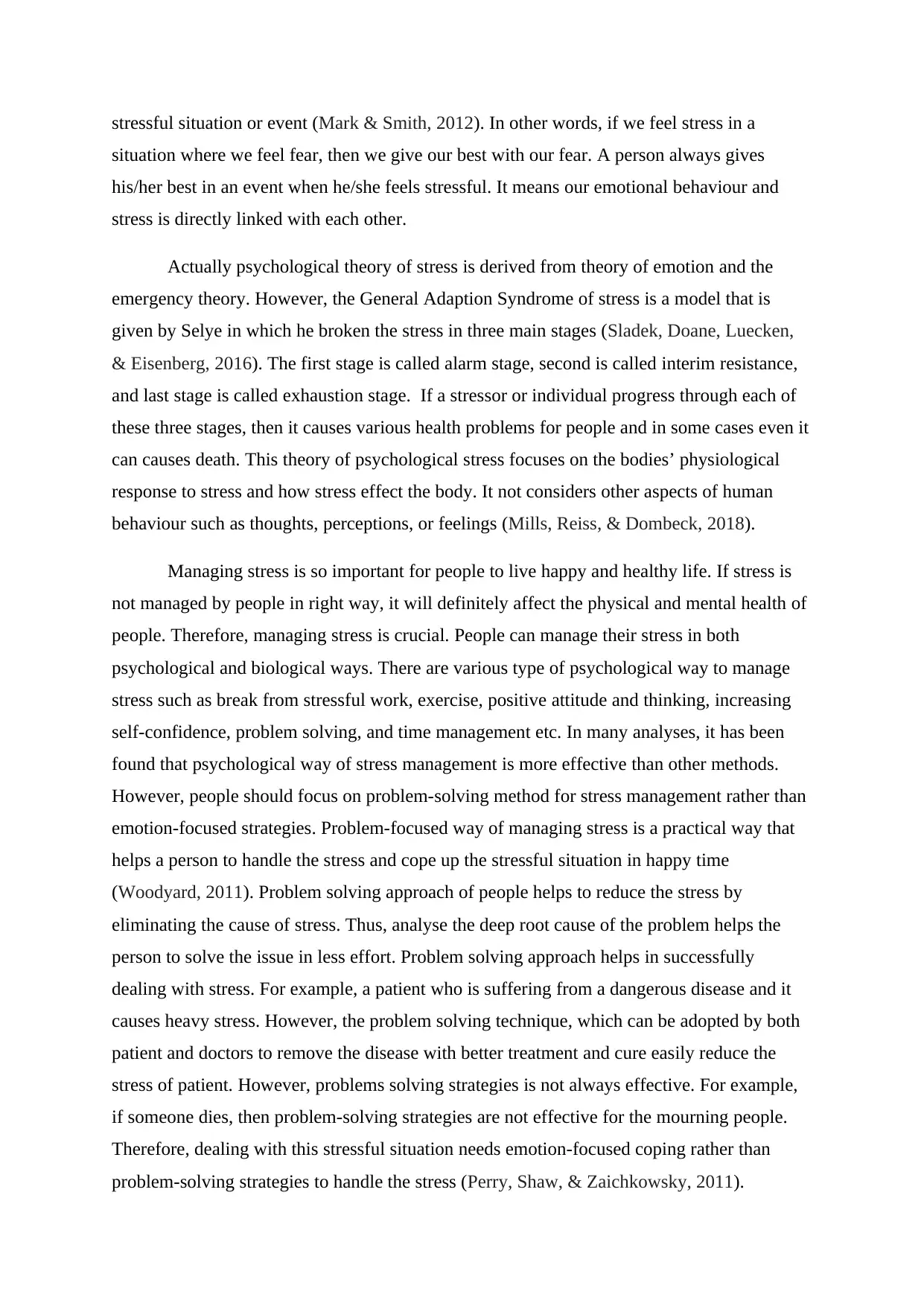
stressful situation or event (Mark & Smith, 2012). In other words, if we feel stress in a
situation where we feel fear, then we give our best with our fear. A person always gives
his/her best in an event when he/she feels stressful. It means our emotional behaviour and
stress is directly linked with each other.
Actually psychological theory of stress is derived from theory of emotion and the
emergency theory. However, the General Adaption Syndrome of stress is a model that is
given by Selye in which he broken the stress in three main stages (Sladek, Doane, Luecken,
& Eisenberg, 2016). The first stage is called alarm stage, second is called interim resistance,
and last stage is called exhaustion stage. If a stressor or individual progress through each of
these three stages, then it causes various health problems for people and in some cases even it
can causes death. This theory of psychological stress focuses on the bodies’ physiological
response to stress and how stress effect the body. It not considers other aspects of human
behaviour such as thoughts, perceptions, or feelings (Mills, Reiss, & Dombeck, 2018).
Managing stress is so important for people to live happy and healthy life. If stress is
not managed by people in right way, it will definitely affect the physical and mental health of
people. Therefore, managing stress is crucial. People can manage their stress in both
psychological and biological ways. There are various type of psychological way to manage
stress such as break from stressful work, exercise, positive attitude and thinking, increasing
self-confidence, problem solving, and time management etc. In many analyses, it has been
found that psychological way of stress management is more effective than other methods.
However, people should focus on problem-solving method for stress management rather than
emotion-focused strategies. Problem-focused way of managing stress is a practical way that
helps a person to handle the stress and cope up the stressful situation in happy time
(Woodyard, 2011). Problem solving approach of people helps to reduce the stress by
eliminating the cause of stress. Thus, analyse the deep root cause of the problem helps the
person to solve the issue in less effort. Problem solving approach helps in successfully
dealing with stress. For example, a patient who is suffering from a dangerous disease and it
causes heavy stress. However, the problem solving technique, which can be adopted by both
patient and doctors to remove the disease with better treatment and cure easily reduce the
stress of patient. However, problems solving strategies is not always effective. For example,
if someone dies, then problem-solving strategies are not effective for the mourning people.
Therefore, dealing with this stressful situation needs emotion-focused coping rather than
problem-solving strategies to handle the stress (Perry, Shaw, & Zaichkowsky, 2011).
situation where we feel fear, then we give our best with our fear. A person always gives
his/her best in an event when he/she feels stressful. It means our emotional behaviour and
stress is directly linked with each other.
Actually psychological theory of stress is derived from theory of emotion and the
emergency theory. However, the General Adaption Syndrome of stress is a model that is
given by Selye in which he broken the stress in three main stages (Sladek, Doane, Luecken,
& Eisenberg, 2016). The first stage is called alarm stage, second is called interim resistance,
and last stage is called exhaustion stage. If a stressor or individual progress through each of
these three stages, then it causes various health problems for people and in some cases even it
can causes death. This theory of psychological stress focuses on the bodies’ physiological
response to stress and how stress effect the body. It not considers other aspects of human
behaviour such as thoughts, perceptions, or feelings (Mills, Reiss, & Dombeck, 2018).
Managing stress is so important for people to live happy and healthy life. If stress is
not managed by people in right way, it will definitely affect the physical and mental health of
people. Therefore, managing stress is crucial. People can manage their stress in both
psychological and biological ways. There are various type of psychological way to manage
stress such as break from stressful work, exercise, positive attitude and thinking, increasing
self-confidence, problem solving, and time management etc. In many analyses, it has been
found that psychological way of stress management is more effective than other methods.
However, people should focus on problem-solving method for stress management rather than
emotion-focused strategies. Problem-focused way of managing stress is a practical way that
helps a person to handle the stress and cope up the stressful situation in happy time
(Woodyard, 2011). Problem solving approach of people helps to reduce the stress by
eliminating the cause of stress. Thus, analyse the deep root cause of the problem helps the
person to solve the issue in less effort. Problem solving approach helps in successfully
dealing with stress. For example, a patient who is suffering from a dangerous disease and it
causes heavy stress. However, the problem solving technique, which can be adopted by both
patient and doctors to remove the disease with better treatment and cure easily reduce the
stress of patient. However, problems solving strategies is not always effective. For example,
if someone dies, then problem-solving strategies are not effective for the mourning people.
Therefore, dealing with this stressful situation needs emotion-focused coping rather than
problem-solving strategies to handle the stress (Perry, Shaw, & Zaichkowsky, 2011).
⊘ This is a preview!⊘
Do you want full access?
Subscribe today to unlock all pages.

Trusted by 1+ million students worldwide
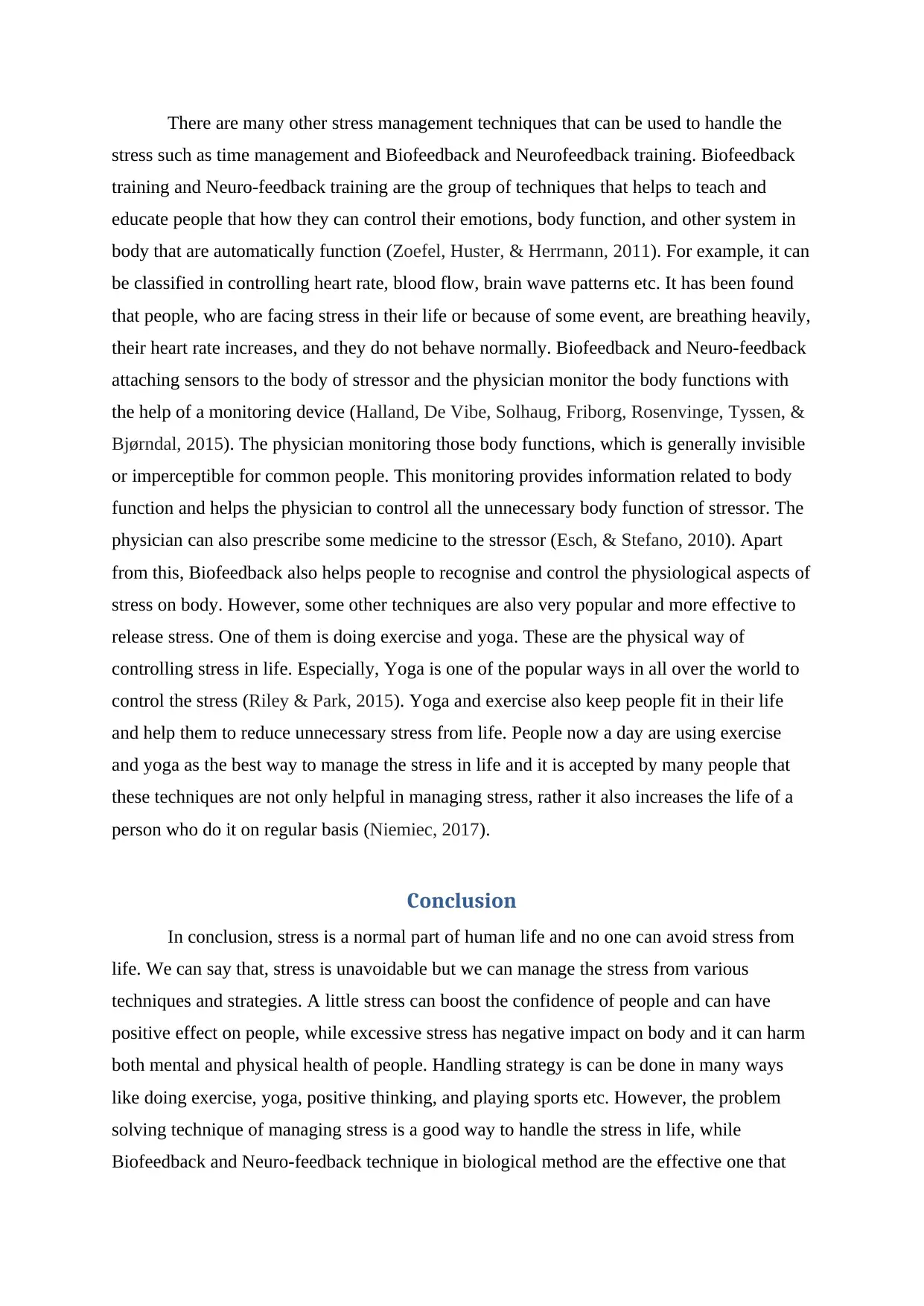
There are many other stress management techniques that can be used to handle the
stress such as time management and Biofeedback and Neurofeedback training. Biofeedback
training and Neuro-feedback training are the group of techniques that helps to teach and
educate people that how they can control their emotions, body function, and other system in
body that are automatically function (Zoefel, Huster, & Herrmann, 2011). For example, it can
be classified in controlling heart rate, blood flow, brain wave patterns etc. It has been found
that people, who are facing stress in their life or because of some event, are breathing heavily,
their heart rate increases, and they do not behave normally. Biofeedback and Neuro-feedback
attaching sensors to the body of stressor and the physician monitor the body functions with
the help of a monitoring device (Halland, De Vibe, Solhaug, Friborg, Rosenvinge, Tyssen, &
Bjørndal, 2015). The physician monitoring those body functions, which is generally invisible
or imperceptible for common people. This monitoring provides information related to body
function and helps the physician to control all the unnecessary body function of stressor. The
physician can also prescribe some medicine to the stressor (Esch, & Stefano, 2010). Apart
from this, Biofeedback also helps people to recognise and control the physiological aspects of
stress on body. However, some other techniques are also very popular and more effective to
release stress. One of them is doing exercise and yoga. These are the physical way of
controlling stress in life. Especially, Yoga is one of the popular ways in all over the world to
control the stress (Riley & Park, 2015). Yoga and exercise also keep people fit in their life
and help them to reduce unnecessary stress from life. People now a day are using exercise
and yoga as the best way to manage the stress in life and it is accepted by many people that
these techniques are not only helpful in managing stress, rather it also increases the life of a
person who do it on regular basis (Niemiec, 2017).
Conclusion
In conclusion, stress is a normal part of human life and no one can avoid stress from
life. We can say that, stress is unavoidable but we can manage the stress from various
techniques and strategies. A little stress can boost the confidence of people and can have
positive effect on people, while excessive stress has negative impact on body and it can harm
both mental and physical health of people. Handling strategy is can be done in many ways
like doing exercise, yoga, positive thinking, and playing sports etc. However, the problem
solving technique of managing stress is a good way to handle the stress in life, while
Biofeedback and Neuro-feedback technique in biological method are the effective one that
stress such as time management and Biofeedback and Neurofeedback training. Biofeedback
training and Neuro-feedback training are the group of techniques that helps to teach and
educate people that how they can control their emotions, body function, and other system in
body that are automatically function (Zoefel, Huster, & Herrmann, 2011). For example, it can
be classified in controlling heart rate, blood flow, brain wave patterns etc. It has been found
that people, who are facing stress in their life or because of some event, are breathing heavily,
their heart rate increases, and they do not behave normally. Biofeedback and Neuro-feedback
attaching sensors to the body of stressor and the physician monitor the body functions with
the help of a monitoring device (Halland, De Vibe, Solhaug, Friborg, Rosenvinge, Tyssen, &
Bjørndal, 2015). The physician monitoring those body functions, which is generally invisible
or imperceptible for common people. This monitoring provides information related to body
function and helps the physician to control all the unnecessary body function of stressor. The
physician can also prescribe some medicine to the stressor (Esch, & Stefano, 2010). Apart
from this, Biofeedback also helps people to recognise and control the physiological aspects of
stress on body. However, some other techniques are also very popular and more effective to
release stress. One of them is doing exercise and yoga. These are the physical way of
controlling stress in life. Especially, Yoga is one of the popular ways in all over the world to
control the stress (Riley & Park, 2015). Yoga and exercise also keep people fit in their life
and help them to reduce unnecessary stress from life. People now a day are using exercise
and yoga as the best way to manage the stress in life and it is accepted by many people that
these techniques are not only helpful in managing stress, rather it also increases the life of a
person who do it on regular basis (Niemiec, 2017).
Conclusion
In conclusion, stress is a normal part of human life and no one can avoid stress from
life. We can say that, stress is unavoidable but we can manage the stress from various
techniques and strategies. A little stress can boost the confidence of people and can have
positive effect on people, while excessive stress has negative impact on body and it can harm
both mental and physical health of people. Handling strategy is can be done in many ways
like doing exercise, yoga, positive thinking, and playing sports etc. However, the problem
solving technique of managing stress is a good way to handle the stress in life, while
Biofeedback and Neuro-feedback technique in biological method are the effective one that
Paraphrase This Document
Need a fresh take? Get an instant paraphrase of this document with our AI Paraphraser
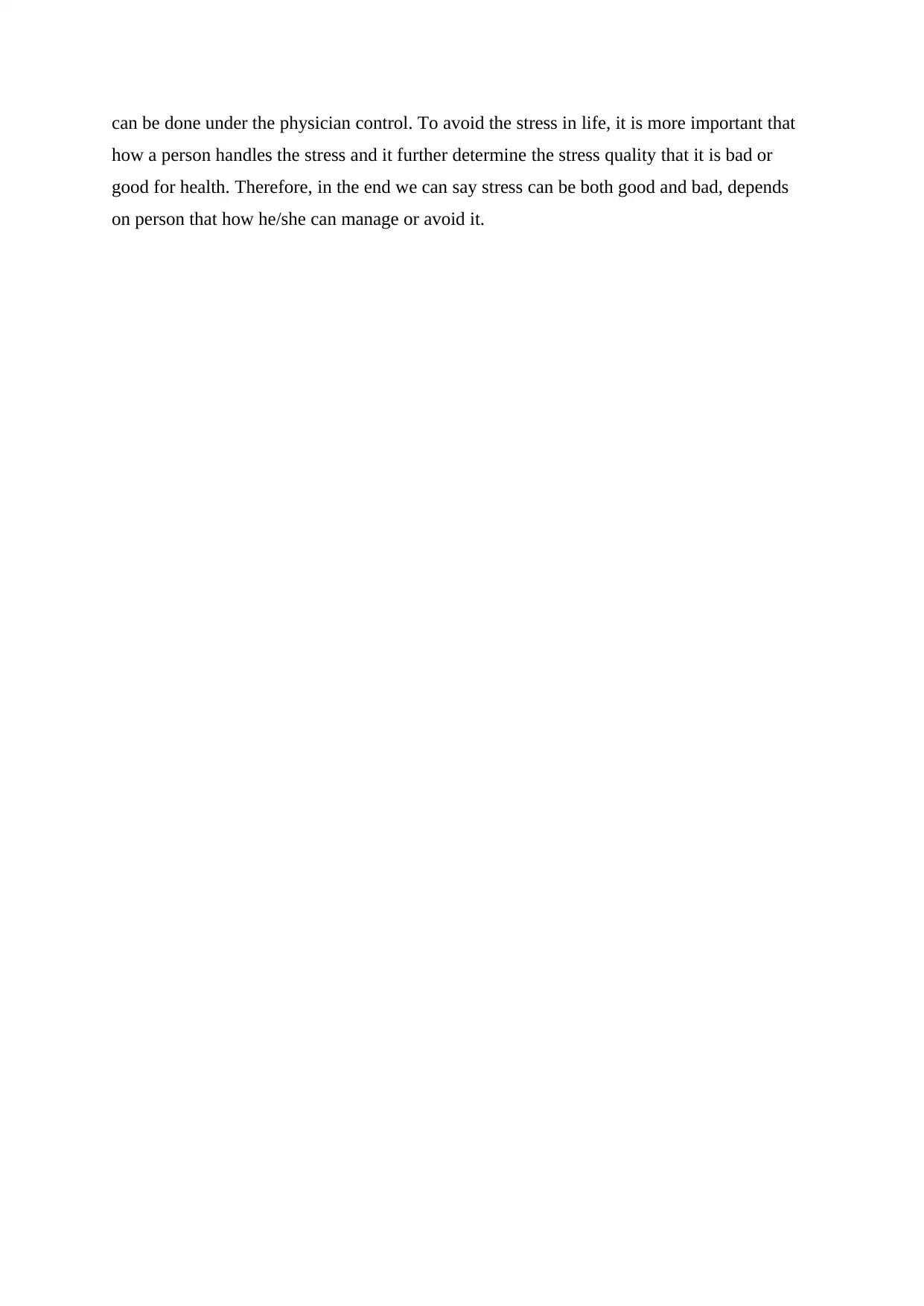
can be done under the physician control. To avoid the stress in life, it is more important that
how a person handles the stress and it further determine the stress quality that it is bad or
good for health. Therefore, in the end we can say stress can be both good and bad, depends
on person that how he/she can manage or avoid it.
how a person handles the stress and it further determine the stress quality that it is bad or
good for health. Therefore, in the end we can say stress can be both good and bad, depends
on person that how he/she can manage or avoid it.
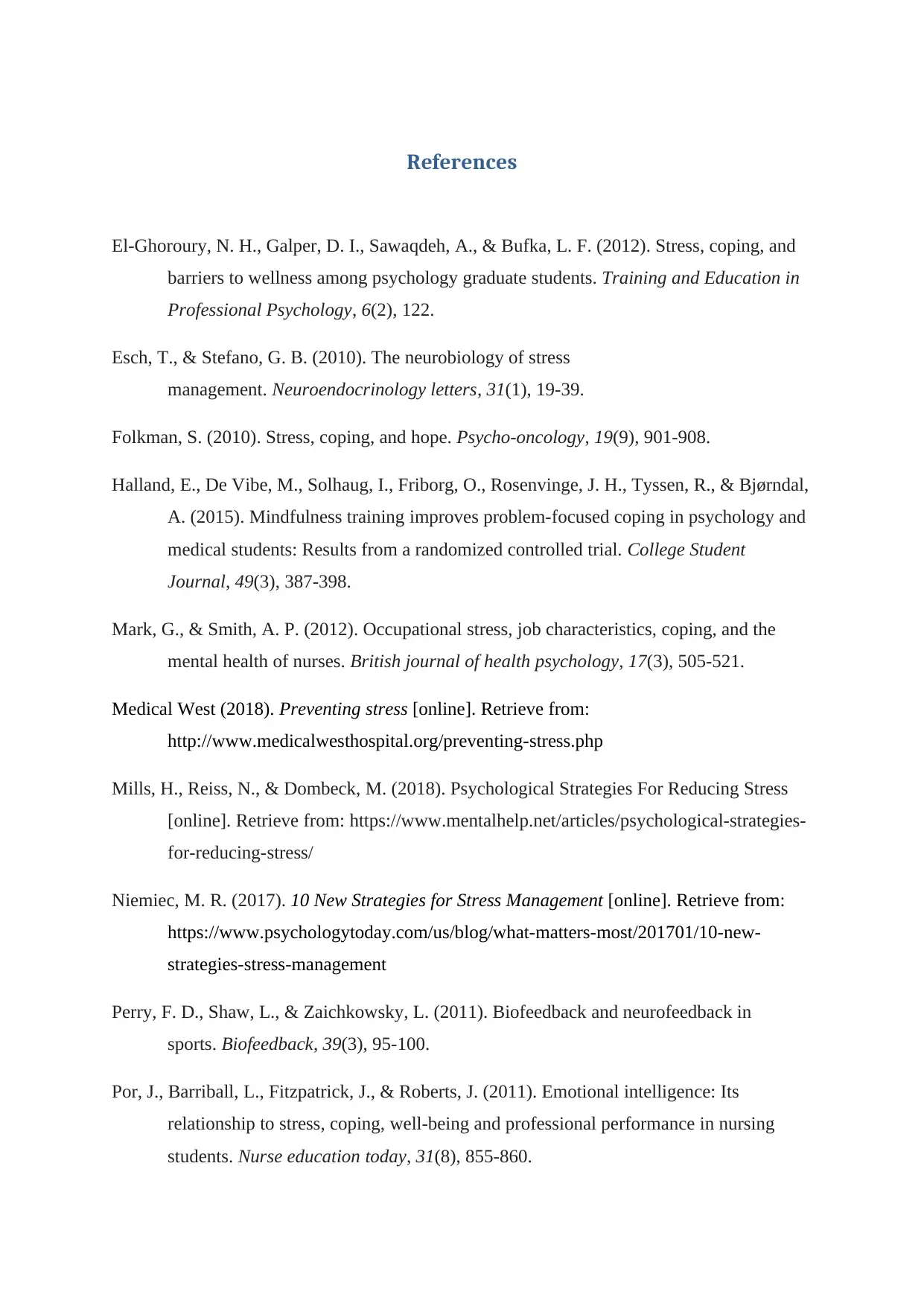
References
El-Ghoroury, N. H., Galper, D. I., Sawaqdeh, A., & Bufka, L. F. (2012). Stress, coping, and
barriers to wellness among psychology graduate students. Training and Education in
Professional Psychology, 6(2), 122.
Esch, T., & Stefano, G. B. (2010). The neurobiology of stress
management. Neuroendocrinology letters, 31(1), 19-39.
Folkman, S. (2010). Stress, coping, and hope. Psycho‐oncology, 19(9), 901-908.
Halland, E., De Vibe, M., Solhaug, I., Friborg, O., Rosenvinge, J. H., Tyssen, R., & Bjørndal,
A. (2015). Mindfulness training improves problem-focused coping in psychology and
medical students: Results from a randomized controlled trial. College Student
Journal, 49(3), 387-398.
Mark, G., & Smith, A. P. (2012). Occupational stress, job characteristics, coping, and the
mental health of nurses. British journal of health psychology, 17(3), 505-521.
Medical West (2018). Preventing stress [online]. Retrieve from:
http://www.medicalwesthospital.org/preventing-stress.php
Mills, H., Reiss, N., & Dombeck, M. (2018). Psychological Strategies For Reducing Stress
[online]. Retrieve from: https://www.mentalhelp.net/articles/psychological-strategies-
for-reducing-stress/
Niemiec, M. R. (2017). 10 New Strategies for Stress Management [online]. Retrieve from:
https://www.psychologytoday.com/us/blog/what-matters-most/201701/10-new-
strategies-stress-management
Perry, F. D., Shaw, L., & Zaichkowsky, L. (2011). Biofeedback and neurofeedback in
sports. Biofeedback, 39(3), 95-100.
Por, J., Barriball, L., Fitzpatrick, J., & Roberts, J. (2011). Emotional intelligence: Its
relationship to stress, coping, well-being and professional performance in nursing
students. Nurse education today, 31(8), 855-860.
El-Ghoroury, N. H., Galper, D. I., Sawaqdeh, A., & Bufka, L. F. (2012). Stress, coping, and
barriers to wellness among psychology graduate students. Training and Education in
Professional Psychology, 6(2), 122.
Esch, T., & Stefano, G. B. (2010). The neurobiology of stress
management. Neuroendocrinology letters, 31(1), 19-39.
Folkman, S. (2010). Stress, coping, and hope. Psycho‐oncology, 19(9), 901-908.
Halland, E., De Vibe, M., Solhaug, I., Friborg, O., Rosenvinge, J. H., Tyssen, R., & Bjørndal,
A. (2015). Mindfulness training improves problem-focused coping in psychology and
medical students: Results from a randomized controlled trial. College Student
Journal, 49(3), 387-398.
Mark, G., & Smith, A. P. (2012). Occupational stress, job characteristics, coping, and the
mental health of nurses. British journal of health psychology, 17(3), 505-521.
Medical West (2018). Preventing stress [online]. Retrieve from:
http://www.medicalwesthospital.org/preventing-stress.php
Mills, H., Reiss, N., & Dombeck, M. (2018). Psychological Strategies For Reducing Stress
[online]. Retrieve from: https://www.mentalhelp.net/articles/psychological-strategies-
for-reducing-stress/
Niemiec, M. R. (2017). 10 New Strategies for Stress Management [online]. Retrieve from:
https://www.psychologytoday.com/us/blog/what-matters-most/201701/10-new-
strategies-stress-management
Perry, F. D., Shaw, L., & Zaichkowsky, L. (2011). Biofeedback and neurofeedback in
sports. Biofeedback, 39(3), 95-100.
Por, J., Barriball, L., Fitzpatrick, J., & Roberts, J. (2011). Emotional intelligence: Its
relationship to stress, coping, well-being and professional performance in nursing
students. Nurse education today, 31(8), 855-860.
⊘ This is a preview!⊘
Do you want full access?
Subscribe today to unlock all pages.

Trusted by 1+ million students worldwide
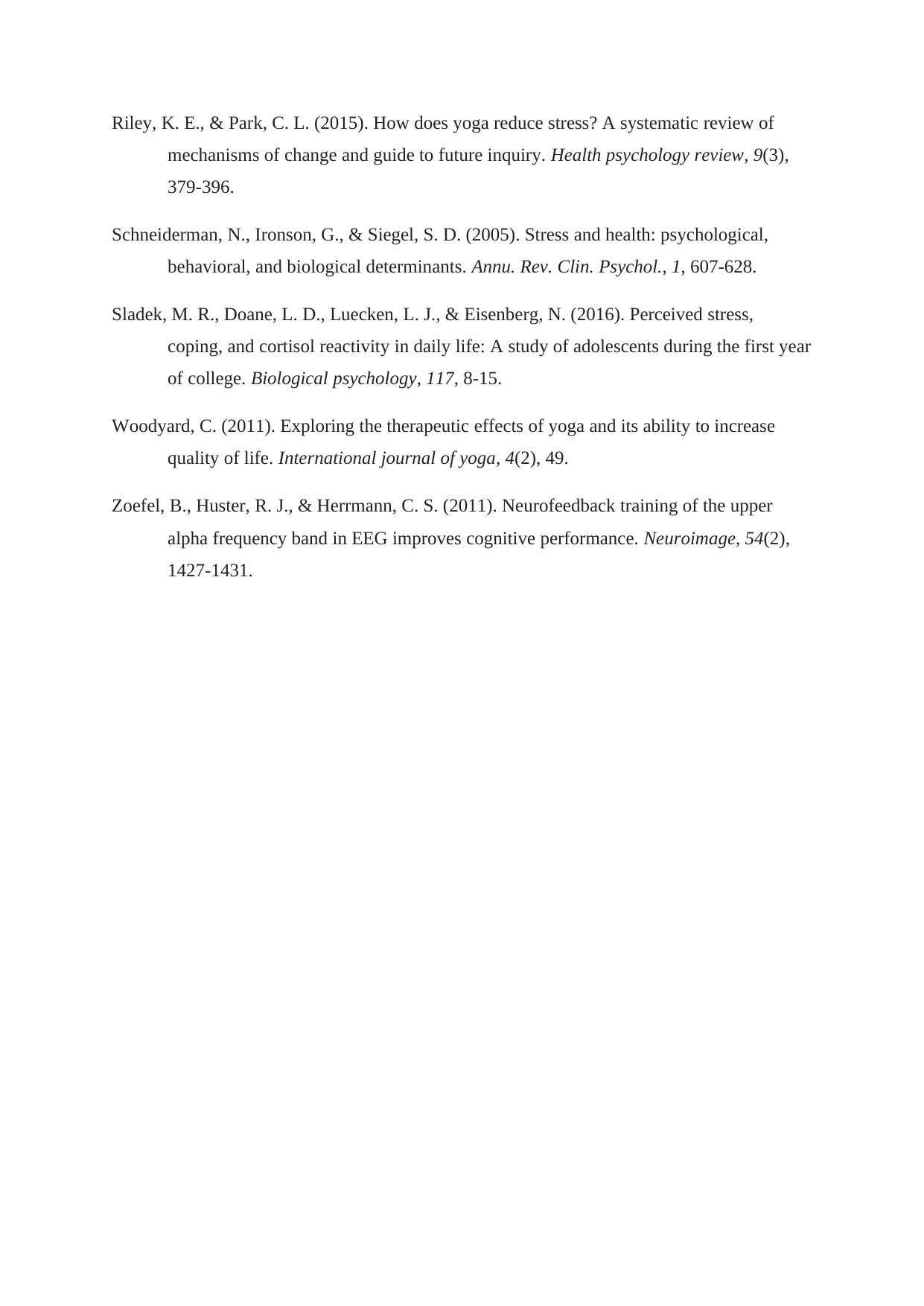
Riley, K. E., & Park, C. L. (2015). How does yoga reduce stress? A systematic review of
mechanisms of change and guide to future inquiry. Health psychology review, 9(3),
379-396.
Schneiderman, N., Ironson, G., & Siegel, S. D. (2005). Stress and health: psychological,
behavioral, and biological determinants. Annu. Rev. Clin. Psychol., 1, 607-628.
Sladek, M. R., Doane, L. D., Luecken, L. J., & Eisenberg, N. (2016). Perceived stress,
coping, and cortisol reactivity in daily life: A study of adolescents during the first year
of college. Biological psychology, 117, 8-15.
Woodyard, C. (2011). Exploring the therapeutic effects of yoga and its ability to increase
quality of life. International journal of yoga, 4(2), 49.
Zoefel, B., Huster, R. J., & Herrmann, C. S. (2011). Neurofeedback training of the upper
alpha frequency band in EEG improves cognitive performance. Neuroimage, 54(2),
1427-1431.
mechanisms of change and guide to future inquiry. Health psychology review, 9(3),
379-396.
Schneiderman, N., Ironson, G., & Siegel, S. D. (2005). Stress and health: psychological,
behavioral, and biological determinants. Annu. Rev. Clin. Psychol., 1, 607-628.
Sladek, M. R., Doane, L. D., Luecken, L. J., & Eisenberg, N. (2016). Perceived stress,
coping, and cortisol reactivity in daily life: A study of adolescents during the first year
of college. Biological psychology, 117, 8-15.
Woodyard, C. (2011). Exploring the therapeutic effects of yoga and its ability to increase
quality of life. International journal of yoga, 4(2), 49.
Zoefel, B., Huster, R. J., & Herrmann, C. S. (2011). Neurofeedback training of the upper
alpha frequency band in EEG improves cognitive performance. Neuroimage, 54(2),
1427-1431.
1 out of 7
Related Documents
Your All-in-One AI-Powered Toolkit for Academic Success.
+13062052269
info@desklib.com
Available 24*7 on WhatsApp / Email
![[object Object]](/_next/static/media/star-bottom.7253800d.svg)
Unlock your academic potential
Copyright © 2020–2026 A2Z Services. All Rights Reserved. Developed and managed by ZUCOL.





